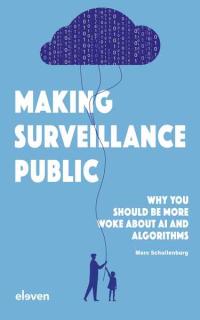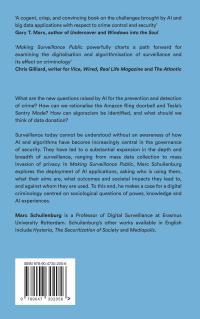Making Surveillance Public
Why You Should Be More Woke About AI and Algorithms
‘In Making Surveillance Public law and philosophy scholar Marc Schuilenburg delivers a cogent, crisp, and convincing book on the challenges brought by AI and big data applications with respect to crime control and security. In contrast to governments reined in by law and ethics, the role of Google, Microsoft and Apple in crime and disorder prevention and detection is largely invisible. Schuilenburg documents the history, identifies the challenges, suggests useful concepts (“data donation”, “algorithmic psychopower”) and offers empirical examples such as Waze. Most importantly, he suggests how to think about the kinds of solutions needed in a radically changing control environment. The book is a valuable contribution to understanding the social embeddedness and consequences of seemingly “neutral” tools and the need for research and policy, in particular as this applies to private sector technology giants not traditionally seen as salient for crime control. The book is accessible to the general reader, but should be of particular interest to criminology, a field that has neglected the topic at its peril’
Gary T. Marx, MIT author of Undercover: Police Surveillance in America and Windows into the Soul: Surveillance and Society in an Age of High Technology
‘Making Surveillance Public provides a crucial discussion of surveillance as an exercise of power and powerfully charts a path forward for examining the digitalisation and algorithmisation of surveillance and its effect on criminology’
Chris Gilliard is a writer, professor and speaker. His work has been featured in Vice, Wired, Real Life Magazine, and The Atlantic
What are the new questions raised by AI for the prevention and detection of crime? How can we rationalise the Amazon Ring doorbell and Tesla’s Sentry Mode? How can algoracism be identified, and what should we think of data donation?
Surveillance today cannot be understood without an awareness of how AI and algorithms have become increasingly central in the governance of security. They have led to a substantial expansion in the depth and breadth of surveillance, ranging from mass data collection to mass invasion of privacy. In Making Surveillance Public, Marc Schuilenburg explores the deployment of AI applications, asking who is using them, what their aims are, what outcomes and societal impacts they lead to, and against whom they are used. To this end, he makes a case for a digital criminology centred on sociological questions of power, knowledge and AI experiences.
Marc Schuilenburg is a Professor of Digital Surveillance at Erasmus University Rotterdam. Schuilenburg’s other works available in English include Hysteria, The Securitization of Society and Mediapolis.
Studio Erasmus: Hoe houden we ons staande in de surveillancestaat? (Dutch)
‘Meer sociologie in debat over surveillance en veiligheid’
Bespreking van bijdrage Marc Schuilenburg tijdens de Nacht van de Sociologie.
Artikel in Quest over hoe AI de opsporing én de misdaad verandert, met bijdragen van Marc Schuilenburg.
“This book on digital surveillance combines criminological theory with surveillance studies and philosophical insights in a very accessible and straightforward manner for a diverse public.”
Book review by Aleš Završnik, Ljubljana University, Slovenia
Het 'publiek maken' van AI en algoritmes
Essay van Marc Schuilenburg waarin de titel van het boek verder wordt uitgelegd.
‘...at once a broad theoretical integration of writing on security and surveillance in the modern era, illustrated by visible problems in the technological fabric of security. ...it has important questions for policy makers and politicians swept up in the technological frenzy.’
Jack R. Greene, School of Criminal Justice and Criminology, Northeastern
University, Boston, USA
Read the rest of this review on Springer Link.
Digital surveillance – SSR Meestervertellers met Marc Schuilenburg
Big Brother is watching you. Maar door gebruik te maken van allerlei ‘slimme’ apparatuur plaatsen we onszelf ook nog eens vrijwillig onder toezicht. En is dat nou wel zo slim? Luister hier naar de podcast!
'Aansprekende voorbeelden en een helder pleidooi voor strengere controle op de digitale controleurs die ons omringen'
Lees de boekbespreking in De Bonjo, belangenorganisatie voor (ex)gedetineerden, hier: Ongebreidelde wildgroei van surveillance
"Het boek maakt ingewikkelde materie inzichtelijk met beeldende en persoonlijke voorbeelden en biedt tegelijkertijd diepgang door stevige theoretische onderbouwing"
- dr. mr. Barbara van Caem, hoofd van de cluster wetenschap bij de Landelijke Portefeuille Gebiedsgebonden Politie
Lees meer van deze recensie in het Tijdschrift voor de Politie via deze link.
‘We moeten ons meer zorgen maken over AI-criminaliteit’
Interview met Marc Schuilenburg in over AI-criminaliteit
“Wanneer alles data produceert, van mijn intelligente horloge en elektrische auto tot mijn deurbel en koelkast, dan komt de politie voor een heel andere werkelijkheid te staan. Dan beschikt de politie niet alleen over eigen datasets, maar ook over niet-politionele datasets, die nog rijker en gevarieerder zijn. Deze omslag heeft grote consequenties voor politieoptreden en hierop is het Wetboek van Strafvordering nog onvoldoende toegesneden.”
Lees meer van dit interview met Marc Schuilenburg in Secondant op: ‘De mens is veranderd van spierbundel naar databundel’
'De strafrechtketen kan niet meer zonder AI. Democratische controle is hard nodig'
Lees het uitgebreide interview met Marc Schuilenburg van De Bonjo, belangenorganisatie voor (ex)gedetineerden, hier: Hoogleraar Digitale Surveillance waarschuwt voor zelflerende algoritmes
‘Hoogleraar Marc Schuilenburg zet in zijn nieuwe boek Making Surveillance Public deze vorm van 'luxe surveillance' centraal. Hij ziet een 'vernetwerkte' samenleving waarin de burger ongewild zelf een 'superpanopticon' tot stand brengt. Daarin is permanent toezicht mogelijk, alleen is onduidelijk door wíe precies.’
Lees verder op De deurbelcamera maakt van de burger ook toezichthouder
'In zijn boek Making Surveillance Public - Why You Should Be More Woke About AI and Algorithms, deelt Schuilenburg zijn onderzoek naar de inzet van AI-toepassingen, de opkomst van AI-criminaliteit en hoe AI het veiligheidsvraagstuk verandert. Bovendien verklaart hij waarom andere vormen van publieke verantwoording noodzakelijk zijn.'
Lees verder op: AI: Een nieuw tijdperk van (on)zichtbare digitale dreigingen
Met een miljoen videodeurbellen plaatst Nederland zichzelf (vaak illegaal) onder surveillance - Interview met Marc Schuilenburg
Lees het interview op Volkskrant.nl.
'‘Algoritmische psychomacht’ noemt Schuilenburg deze psychologische prikkels die ons gedrag beïnvloeden en onze emoties sturen. In dezelfde categorie plaatst hij de technologie die werd ingezet om Stratumseind, een bekende en drukbevolkte uitgaansstraat in Eindhoven, veilig te houden. Daar is geëxperimenteerd met de verspreiding van de geur van sinaasappels, die kalmerend en rustgevend zou werken, en dus de veiligheid zou kunnen vergroten en de agressie zou kunnen verminderen – zowel in het algemeen als zeer lokaal en in real time, bijvoorbeeld wanneer sensoren ergens een hoop geschreeuw opvangen, en de geur dus gericht verspreid kan worden.'
Lees verder op ‘Surveillance is een vast onderdeel van ons leven geworden, en dat zal alleen maar toenemen’
De mogelijkheden die Big Data, AI en algoritmes bieden, veranderen het veiligheidsvraagstuk wereldwijd in een razend tempo. Bedrijven maken veel winst met ‘veiligheidsproducten’ die gebruikmaken van AI. Overheden zetten AI-innovaties onder meer in bij toezichthouding. Maken deze AI-toepassingen onze samenleving daadwerkelijk veiliger?
Lees verder op: AI surveilleert erop los | TNO
'Volgens bijzonder hoogleraar digitale surveillance Marc Schuilenburg hebben wij geen geheimen meer. Bij alles wat we doen kijkt er wel iets of iemand mee die onze gangen registreert. We weten het, maar doen er gewoon aan mee. Zo diep zit digitale surveillance in de haarvaten van onze samenleving: ‘We herkennen het vaak niet eens meer.’
Lees verder op www.ftm.nl








